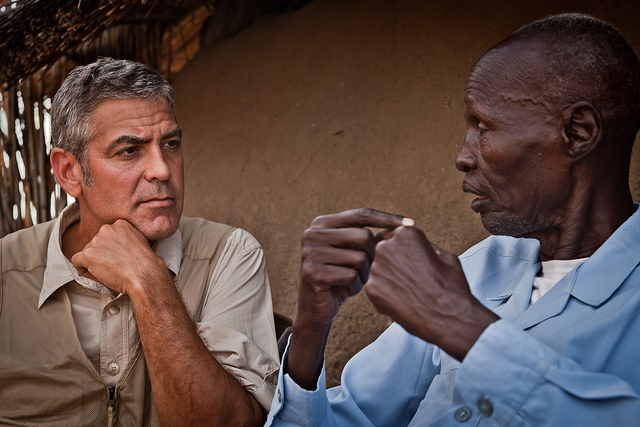
This weekend George Clooney will again leverage his star power, this time in a feature, “I Spy: George Clooney turns long-lens photography into a force for good, aiming satellites at human-rights violations in Sudan” by John Horn in the LA Times Magazine. The article, online now, will appear in the Sunday Edition of the LA Times.
The profile leads with a description of Clooney and Enough Project Co-Founder John Prendergast’s inspiration to start the Satellite Sentinel Project while on a trip to Sudan in 2010.
“It’s spying if it’s a country. It’s spying if it’s the United Nations, maybe. But what if I’m a paparazzo with a lens 400 miles up? How is that spying? I’m just a tourist taking pictures and putting it on the Web. I don’t understand where that’s wrong,” wondered Clooney as he looked up at the stars outside a mud hut in Sudan.
“Prendergast paused for a moment and then guessed at what Clooney was proposing. ‘You know, you might be able to get away with that.’”
After returning from his trip to Sudan with Prendergast, Clooney secured the partnership of Google and the private satellite company DigitalGlobe, and enlisted the expertise of the Harvard Humanitarian Initiative and media capabilities and ground intelligence of the Enough Project. The far-fetched idea became a reality in January 2011: The Satellite Sentinel Project “deploys commercial satellite technology to track actual and potential human-rights violations in nearly real time.”
The profile notes the successes of SSP including the August reports showing evidence of mass graves, and the October report showing Sudan’s Central Reserve Police committing war crimes near a U.N. compound. The most recent report, released December 1, shows Blue Nile Burning: Evidence of the Destruction of ‘Amara Village. The magazine also features images from Clooney’s trips to Sudan, taken by Enough Project photographer Tim Freccia.
Though his rise to fame has been through acting, “Clooney is now the ultimate celebrity photographer, except his lenses are focused not on red carpets but on distant atrocities,” Horn writes.
“The one thing I learned from Bono early on,” Clooney says of U2’s lead singer, “Was you have to pick [a cause] you specifically want to work on, and you have to really engage. You have to be more knowledgeable than most reporters would be on it, so that when they try to make you sound stupid because you’re just an actor…you go, ‘Well, I can name all the rebel leaders, and I have [their numbers] on my phone.’
Clooney continues to support the work of SSP, using his clout as one of the most famous celebrities in Hollywood to fundraise and generate awareness of the issues. He starred in two recent major films, “The Ides of March,” which he also directed, co-wrote, and produced, and “The Descendants.” As the profile points out, the actor looks forward to more directing and writing roles in the future, “But as Clooney continues to aim his film camera on soundstages, his wider lens will keep orbiting the skies over eastern Africa—inspecting, waiting, keeping watch.”
Photo: George Clooney meets with elders in South Sudan (Enough/Tim Freccia)

